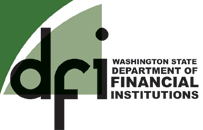From the Field - Common Exam Findings
The following are some of the common violations our exam teams in each industry found during examinations in the last quarter:
- MSB Programs
- Mortgage Originations - Mortgage Broker
- Mortgage Originations - Consumer Loan
- Mortgage Servicing
- Escrow Agent
MSB Programs
Material Changes - Licensees must provide notice to the Department specifying material changes as required by RCW 19.230.150(1). For all material changes, a licensee shall file with the director within thirty days, notification indicating any material changes in information provided in a licensee's initial application as prescribed in rule by the director.
IT/IS - Licensees must develop, implement, and maintain a written information security program as required under 16 CFR 314 and WAC 208-690-250. The program must include the elements required under 16 CFR 314.4.
PI: ADTL or OTL Requirements - Licensees are required to ensure that sufficient permissible investment (PI) is maintained to cover company-wide monthly average daily transmission liability (ADTL), or the actual outstanding transmission liability (OTL) at all times. Additionally, ensure that PI is maintained in accordance to RCW 19.230.210.
NMLS Reporting - Licensees must accurately and timely file Money Service Business Call Reports (MSBCRs) as required under RCW 19.230.152 and WAC 208-690-105. For virtual currency licensees, virtual currency balances must be reported as outstanding transmission liability, and the value of virtual currency assets must be reported for permissible investments.
Risk Assessment - Licensees are required to develop an adequate risk assessment to ensure adequate AML controls are in place. The Risk Assessment should incorporate specific elements posed by the location, size of, nature, and volume of the financial services provided by the money services business, including risks posed by the Company’s agents. An adequate risk assessment must be developed to ensure adequate AML controls are in place.
Mortgage Originations / Mortgage Broker
Anti-Money Laundering Program - The Financial Crimes Enforcement Network (FinCEN) required mortgage broker licensees to have an anti-money laundering (AML) program by August 13, 2012. This violation continues to be one of the most commonly cited by examiners. Though licensees provide written AML programs, the documentation is rarely specific to the products, clients, or size of the broker’s operation. This risk assessment is one of the five “pillars” of an effective AML program. See FinCEN’s AML requirements at 31 CFR Part 1029.210 for the other pillars of an effective AML program.
Mortgage Call Reports (MCR) - Examiners continue to cite companies for MCRs that are not completed as required. Standard mistakes are not listing sponsored MLOs with zero production, reporting different application pipeline totals at the end of a quarter and the beginning of the subsequent quarter, and reporting erroneous fee and revenue amounts. If you are not sure how to complete your MCR please review the Standard MCR Field Definitions. See WAC 208-660-400.
Rate Lock Agreements - Licensees must issue a rate lock agreement within three business days of an interest rate lock. In addition, a new rate lock agreement must be issued to the borrower within three business days of a change to the locked interest rate. Common mistakes are not updating lock agreements when extended and not naming the lender guaranteeing the lock. The Department provides a model rate lock agreement that, when completed correctly, contains all the fields required. See WAC 208-660-430(3).
Mortgage Originations / Consumer Loan
Licensing Processing and Underwriting Supervisors: Any manager who is the day-to-day operational supervisor of loan processors or underwriters must hold a license. The license can be from any state.
Develop Supervisory Plans: WAC 208-620-301(6) requires that licensed managers must prepare and maintain written supervisory plan for the employees they supervise. Plans must include the number of employees supervised and their physical locations, how the supervisor will adequately supervise employees not in the same location as the supervisor, and the type and volume of work performed by the supervised employees.
Advertising in Compliance with the Act: Licensees are prohibited from advertising using the term “free” or any other similar term that implies there is no cost to the borrower. This includes statements such as “No Cost Loan” and “No Closing Costs.” WAC 208-620-630(8)
Mortgage Loan Servicing
Suspense Account: The most common servicing violation in the first quarter of 2020 is failure to properly maintain a suspense account. WAC 208-620-900(3)(d) prohibits money in a suspense account from being applied to company fees. When enough money is in the account to cover the contractual periodic payment of principal and interest, you must apply the funds as of the date it became available.
Accurate Annual Assessments: We continue to cite the failure to file accurate annual assessments for 2018 filings, and we have featured this in past newsletters. The Department is beginning to review 2019 filings, and we are optimistic our past focus on this violation will lead to more accuracy in the most recent filings.
Escrow Agent
Escrow agents continue to exhibit satisfactory overall compliance. The most common violations in the first quarter of 2020 remain the same as the fourth quarter of 2019.
Settlement Statement Procedures - Examinations revealed clerical errors on lender prepared Closing Disclosures, most commonly identifying the escrow fee as being paid to a title company. Though the Closing Disclosure is the lender’s responsibility, the best practice for escrow agents is to notify the lender of any errors on their Closing Disclosures.
Update Information Security Program - WAC 208-680-532 provides the minimum standards for an Information Security Program, including that it be evaluated for possible updates at least annually. Even if the annual risk assessment does not lead to changes, that must be documented in the agent’s books and records.
